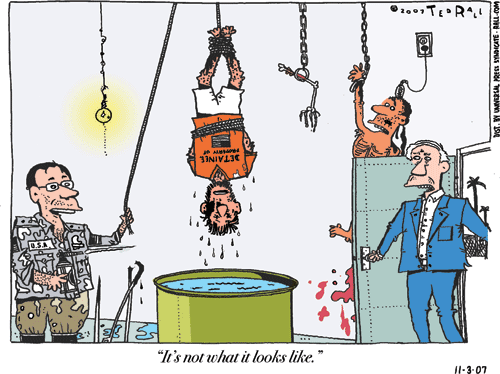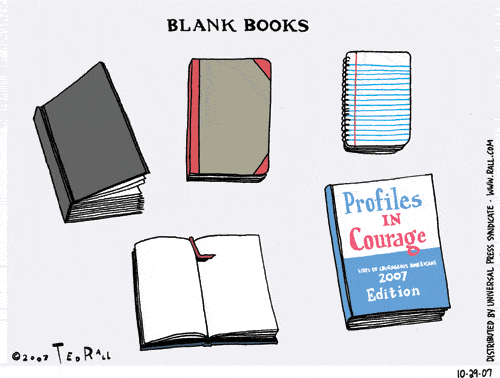
THE REAL STORY - Following his presentation Oct. 4 at the University of
San Francisco, retired Maj. Gen. Antonio Taguba visits with Francisco
Father Louis Vitale. Taguba led the investigation of Abu Ghraib prison
abuse in 2004. Father Vitale and Jesuit Father Steve Kelly are on trial
for trespassing at a military base while attempting to deliver a letter
protesting U.S. interrogation policies. (Catholic San Francisco/Michael
Vick)
Abu Ghraib's prime investigator slams handling of prison scandal
By Michael Vick
10/10/2007
Catholic San Francisco (www.catholic-sf.org)
The Abu Ghraib prison abuse was actually more severe than reported in
mainstream media outlets, and former Secretary of Defense Donald Rumsfeld
was less than honest in his knowledge of the notorious scandal, charges
the retired Army major general who headed the investigation of the abuse.
In an Oct. 4 appearance at the University of San Francisco's Center for
the Pacific Rim, retired Maj. Gen. Antonio Taguba accused Rumsfeld of
being untruthful with him and also misleading Congress when the former
secretary of defense claimed he had not read the Army official's report.
"I would find it rather disturbing if no one had forwarded the report to
the secretary of defense," said Taguba. "I do not believe he had not seen
the report."
In 2004, amidst allegations of abuse in its military prisons in Iraq, the
Army ordered Taguba to conduct an investigation at Abu Ghraib prison west
of Baghdad. Although by order of his commanding officers his investigation
was limited in scope to the military police at Abu Ghraib, Taguba was
nevertheless critical of military intelligence, the CIA and private
contractors for their roles in abuse at the prison.
Accompanying the report were more than 100 photographs recovered during
the investigation, some of which were later leaked to CBS and aired on "60
Minutes." Taguba called the photos of abuse shown in the media mild in
comparison to others that have not been made public.
"Not everyone saw what I saw," Taguba said.
Shocking, unreleased photos
The unreleased images, he said, include an American soldier sodomizing a
female Iraqi detainee. The soldier could be seen videotaping while engaged
in the act, while another soldier also videotaped it in the background, he
said.
Taguba cautioned that releasing the photos in their totality would, in his
opinion, "irrevocably harm" the reputation of the United States and lead
to further bloodshed. He said that to his knowledge only his commanding
officers, members of the Bush administration and select members of
Congress have seen all the photos. Taguba said he even initially kept the
photos from his own investigators, not wanting to prejudice their work.
"The report was classified, but not because we were trying to keep it from
the American public," Taguba said. "It's not my place to release it."
Taguba went through official channels with the report, giving it only to
his superiors. However, he said whoever leaked the report and photos was
acting within the First Amendment.
"If it weren't for CBS, nobody would know about this," said Taguba.
After his report was finalized and delivered to his superiors, Taguba
himself became a target, he said. Gen. John Abizaid, then commander of
U.S. forces in Iraq, told him that "you and your report will be
investigated."
Taguba recalled his surprise at being the subject of scrutiny. "All of a
sudden, I became the problem," he said. "I was the man everybody
ostracized. I am now part of the Mafia. I'm now a suspect."
Taguba said his immediate superiors saw the photos and the report, but
that Abizaid refused to look at the photos. Taguba said he offered to give
them to the general's aide and to his lawyer, and also offered to leave a
copy with him in the event he might wish to review them later, all
requests Abizaid reportedly denied.
Rumsfeld uninformed
Ordered back to the Pentagon in May 2004, Taguba briefed senior White
House and military officials, including Rumsfeld; Gen. Richard Meyers,
then chairman of the Joint Chiefs of Staff; and Paul Wolfowitz,
then-deputy secretary of defense. Taguba told the USF audience that the
meetings were unproductive and brief.
It was during this meeting, Taguba said, that Rumsfeld first told him that
he had not read the report nor seen the photos. In June, Taguba told The
New Yorker's Seymour Hersh that when Rumsfeld repeated this claim in
congressional testimony, the general found it hard to believe the
secretary.
Taguba told Hersh that one possible explanation for Rumsfeld not seeing
the report and photos could have been that his aides and military
officials did not want to deliver bad news to the secretary, who many
privately acknowledge had a bad temper. In the end, Taguba dismissed this
possibility.
"Rumsfeld is very perceptive and has a mind like a steel trap," Taguba
told Hersh. "He's trying to acquit himself, and a lot of people are lying
to protect themselves."
Calls to the Department of Defense and to the Hoover Institution at
Stanford University, where Rumsfeld recently received a year-long
fellowship, had not been returned by press deadline.
Taguba was later ordered to appear on the Sunday broadcast talk shows, an
order he refused.
"It was the first time I had refused to obey an order, but I told them
unless I was given due cause, I could not do it," Taguba said.
Taguba said his abrupt retirement came in the wake of his report, and his
dismissal was likely the result of his outspoken criticism of the policies
that led to the abuse at Abu Ghraib.
Forced retirement
In January 2006, Taguba was instructed by Gen. Richard A. Cody, the
Army's vice chief of staff, to retire by January 2007. Reportedly, no
explanation was given. The retirement ended a 34-year military career.
"I offered to stay on as a one-star general, but that was refused," Taguba
said.
Taguba spoke before a large crowd at USF, with some sitting on the floor.
He took a handful of questions after his presentation and stayed an
additional 15 minutes to visit with audience members.
Among those who stayed to speak with the general was Franciscan Father
Louis Vitale, who along with Jesuit Father Steve Kelly faces trial Oct. 17
for federal trespass at Fort Huachuca in Arizona in connection with a
protest against torture. The priests were attempting to deliver a letter
last November to then head of Fort Huachuca, Maj. Gen. Barbara Fast, who
had been implicated in the Abu Ghraib scandal. The Army formally cleared
her of all charges.
Taguba told Father Vitale that he and Father Kelly should be remembered as
heroes for their actions.
"It was so worth it to be in the presence of someone trying to find the
truth," said Father Kelly.
Father Vitale echoed his fellow priest.
"Gen. Taguba really is a very honest man," he said. "He has given us a
very credible eye into what was going on and continues to go on in the
military."
USF student Sebastian Crawford said Taguba's speech gave him both hope for
the future and a window into the present.
"There are still men and women who do the right things for the right
reasons," said Crawford, 22. "The fact that he was forced to retire shows
the very dark times our nation is going through."
A difficult lesson
Taguba said Abu Ghraib was a lesson in what democratic governments must
never do — namely, sink to the level of those they are fighting against.
He said the ultimate cost for doing so will be paid by troops on the
battlefield.
"Abu Ghraib was an incendiary that protracted the war in Iraq," Taguba
said.
Taguba lamented that in spite of his report and others critical of those
in command of the troops, no one higher than the rank of sergeant has been
prosecuted for the abuse.
"I have yet to see a see senior policy maker, someone in government, a
contractor, or a CIA operative go to jail," said Taguba. "We prosecuted
only those directly involved to 'save the bigger picture.' What about our
policy of advancing democracy? That's the bigger picture."
This story was made available to Catholic Online by permission of Catholic
San Francisco (www.catholic-sf.org),official newspaper of the Archdiocese
of San Francisco, Calif.
http://www.catholic.org/diocese/diocese_story.php?id=25621&page=2


No comments:
Post a Comment